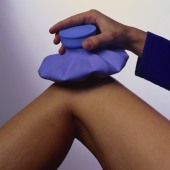- The Best Time of Day to Drink Bone Broth to Maximize Health Benefits
- 8 Ways to Increase Dopamine Naturally
- 7 Best Breads for Maintaining Stable Blood Sugar
- Gelatin vs. Collagen: Which is Best for Skin, Nails, and Joints?
- The Long-Term Effects of Daily Turmeric Supplements on Liver Health
- Could Your Grocery Store Meat Be Causing Recurring UTIs?
- Are You Making This Expensive Thermostat Error This Winter?
- Recognizing the Signs of Hypothyroidism
- 10 Strategies to Overcome Insomnia
- Could Artificial Sweeteners Be Aging the Brain Faster?
Knee Pain May Not Be Helped by Glucosamine


The dietary supplement glucosamine does not slow cartilage damage in people with chronic knee pain, according to a new study.
Millions of Americans take glucosamine in an effort to treat osteoarthritis of the knee and other joints. The most common form of arthritis, osteoarthritis is related to normal wear and tear of the joints.
The new study, published online March 11 in the journal Arthritis & Rheumatology, included about 200 people with mild to moderate pain in one or both knees. They were randomly selected to drink 1,500 milligrams a day of glucosamine or a placebo added to a 16-ounce bottle of diet lemonade for 24 weeks.
MRI scans were used to assess cartilage damage in the patients’ knees. Reductions in cartilage damage were no greater in the glucosamine group than in the placebo group, and taking glucosamine did not reduce knee pain, according to a journal news release.
“Our study found no evidence that drinking a glucosamine supplement reduced knee cartilage damage, relieved pain or improved function in individuals with chronic knee pain,” said researcher Dr. C. Kent Kwoh, director of the University of Arizona Arthritis Center.
A 2007 survey found that 10 percent of American adults used glucosamine.
More information
The U.S. National Institute of Arthritis and Musculoskeletal and Skin Diseases has more about knee problems.
Source: HealthDay
Copyright © 2026 HealthDay. All rights reserved.










